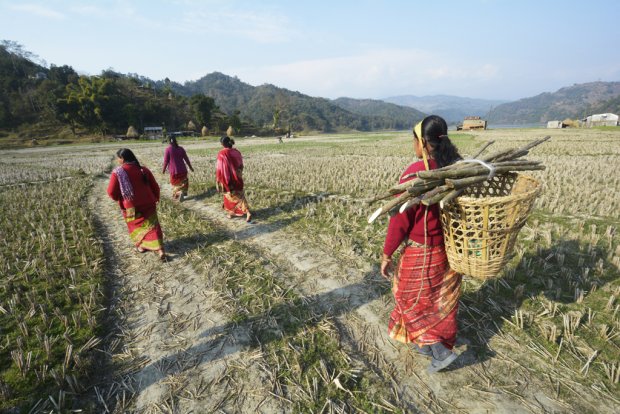How Digital Tools Are Transforming Nepal’s Agriculture: Stories from the Field
- Pitambar Sigdel

Kathmandu- At the heart of Nepal’s agricultural transformation are stories of farmers like Gopal Giri and Meena Tondon, whose lives and livelihoods are being reshaped by digital technology. Their stories were at the forefront of the International Digital Agriculture Forum, held recently in Kathmandu, where the future of farming in the country was explored through real-life experiences and expert insights.

The event, themed ‘Innovate, Cultivate, Thrive: Advancing Agriculture with Digital Solutions,’ brought together farmers, government representatives, tech innovators, and international experts to discuss the role of digital tools in revolutionizing agriculture. As Nepal's agricultural sector faces numerous challenges, including market access, climate change, and information gaps, technology is proving to be a powerful ally.
For farmers like Gopal, a dairy farmer from Pokhara, mobile technology has streamlined daily tasks that used to take hours. ‘I used to spend so much time manually tracking my milk sales,’ Gopal shared. ‘Now, I receive instant updates through SMS. This change has saved me time and boosted my income.’ His story is emblematic of how even simple digital tools can have a profound impact on efficiency and profitability.
Similarly, vegetable grower Meena Tondon has embraced technology with enthusiasm. Thanks to the GeoKrishi app, she now has access to real-time market prices, enabling her to make informed decisions on when to sell her produce. ‘Before, I used to rely on middlemen or outdated market information,’ she explained. ‘Now, I can plan my sales and reduce waste, which has significantly increased my profits.’
These individual success stories reflect the broader trend of farmers across Nepal turning to digital solutions to address long-standing challenges. The forum, which saw 135 participants, including 11 international experts and 29 national representatives, highlighted the urgency of integrating technology into agriculture to drive growth and sustainability.
Bridging the Digital Divide in Agriculture
While the promise of digital agriculture is clear, the forum also addressed the gap between technological advancements and their accessibility to Nepal's smallholder farmers. Many rural farmers still face barriers such as limited digital literacy, unreliable internet access, and a lack of awareness about available tools. The discussions underscored the need for tailored solutions that account for these challenges.
One of the prominent voices at the forum, Prof. Athula Ginige, a leading figure in digital agriculture, stressed that technology can be a game-changer for smallholder farmers globally. ‘Digital solutions can empower those who are most vulnerable to poverty and food waste,’ he said, highlighting the need for inclusive approaches that ensure no farmer is left behind.
Government initiatives were also at the center of discussions. Shabnam Shivakoti from the Ministry of Agriculture and Livestock Development provided updates on key projects like the E-hatbazar virtual commodity market and the introduction of digital land records. ‘These innovations are vital for improving market access and operational efficiency for farmers,’ Shivakoti noted, signaling the government’s commitment to accelerating digital transformation in the sector.
Local Innovation Drives Change
Nepal’s startup ecosystem is also playing a pivotal role in driving digital agriculture. One such platform, Paicho Pasal, is connecting farmers directly to consumers, cutting out intermediaries and ensuring fairer prices. ‘Our goal is to help farmers get the value they deserve for their hard work,’ said a representative of the startup. This model not only benefits farmers but also offers consumers access to fresher, more affordable produce.
The forum culminated in a series of key recommendations, including the need for stronger local government leadership in promoting digital agriculture, staff training in new technologies, and the widespread adoption of advanced tools like IoT-based irrigation systems and drone monitoring for crop and livestock management. A major point of discussion was the importance of developing digital tools that accommodate farmers with varying levels of literacy and digital exposure.
Judith Almodovar from USAID-Nepal, one of the international experts at the forum, emphasized the critical need for equitable access to technology. ‘We need to ensure these tools are accessible to every farmer, no matter where they are or what their education level is,’ she said. ‘Only then can we ensure that digital agriculture becomes a force for good.’
A Hopeful Future for Nepal’s Farmers
The stories of Gopal and Meena, along with the insights shared by experts and policymakers, paint an optimistic picture of a future where agriculture in Nepal is powered by innovation. The forum underscored that digital solutions are not just conveniences; they are lifelines for farmers navigating the complexities of modern agriculture.
As the momentum for digital agriculture builds in Nepal, the collaboration between farmers, tech innovators, and policymakers is vital. With continued efforts to bridge the digital divide, the future looks brighter for Nepal’s agricultural sector, where technology and tradition can coexist, helping farmers thrive in an increasingly competitive and unpredictable world.




Feedback